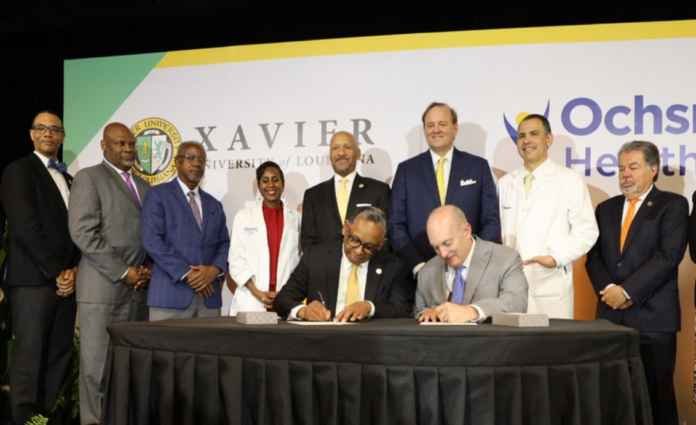By Lottie L. Joiner/Originally published by thegrio
NEW ORLEANS— Xavier University of Louisiana and Ochsner Health leaders signed a legal agreement today to create the nation’s fifth HBCU allopathic medical school, a move that physicians assert can mitigate disparities that kill Black people with some diseases two times more often than others.
The students at Xavier Ochsner College of Medicine, the only HBCU medical school on the Gulf Coast, will receive cultural competency training, said Xavier President Reynold Verret. And in addition to a curriculum that examines and promotes health equity, the doctors of color who graduate from the school will be role models in underserved communities, said Leo Seoane, executive Vice President and Chief Academic Officer at Ochsner.
Those distinct aspects of the medical school are significant because most doctors in the U.S. might not understand customs, challenges, fears and sources of pride within the Black community. And it’s highly unlikely that they look like the people of color they treat. Less than 6% of doctors in the United States are Black. And the health outcomes for Black patients are deadly and dismal.
The CDC reports that Black people are less likely than white people to be current on screenings for breast, cervical and colon cancer. And while white women are more likely to get breast cancer, Black women are 40% more likely to die from it. Even when adjusted for tumor stage when diagnosed with colon cancer, Black people are 20% more likely to die from colon cancer within five years of diagnosis. And Black men are twice as likely to die from prostate cancer than other men.
That’s one of the many reasons that Dr. Yolanda Lawson, president of the National Medical Association, which amplifies the interests of Black doctors and patients, said she is excited and optimistic about the Xavier Oschner medical school. “This is a pathway to reduce and hopefully, ultimately eliminate health care disparities,” she said, referencing an article last year about the effect of having access to a Black doctor. “…Just having a Black physician in the county prolonged the lives of not just Black folks, but white folks, too.”
Xavier, the nation’s only historically Black Catholic university, has long been among the top 10 schools that send African-American graduates to medical school. And Xavier’s College of Pharmacy is among the top producers of Black pharmacists.
Seoane cites that success as a driver in partnering with the school. “Xavier’s excellence in undergrad and in STEM and being able to put more diverse people into medical school, Ochsner’s excellence in residencies and fellowships and an academic medical center, the two coming together with a shared mission to train more Black and brown physicians for the United States just makes sense,” he said.
The opening date of the school is not set, as the accreditation process takes about three years. When the school opens, the first class will include about 50 students.
Along with cultural competency, Verret said the new medical school will equip new doctors to understand patients’ circumstances, have compassion for their struggles and speak to patients in the right tone. That could alleviate concerns among Black patients, who report feeling the need to change how they dress and speak to reduce medical bias.
“Education in medicine is seeing medicine as not just a technological, scientific field,” Verret said. “It is a field that there’s a humanistic dimension of medicine, which we must use as well.”
The Xavier Ochsner College of Medicine will be a subsidiary of Xavier, and will be governed by a joint 50/50 board of Ochsner and Xavier representatives, said Seoane, who will be the founding dean. Ochsner group physicians will become faculty members of the Xavier Ochsner College of Medicine as assistant professors, associate professors and professors.
Ochsner is the largest health care provider in Louisiana. The nonprofit health system serves more than a million people in the Gulf Coast area and has trained medical students with its accredited resident and fellowship programs for more than 50 years.
That’s the type of support doctors in training need, said Lawson. “For a medical school, you need that hospital relationship,” said the Dallas-based OB-GYN. “That’s been one of the struggles, making sure you have that clinical site.”
There are 189 predominantly white medical schools in the U.S. and only four at HBCUs – Meharry Medical College in Tennessee, Howard University College of Medicine in Washington D.C., Morehouse School of Medicine in Georgia and Charles R. Drew University of Medicine and Science in California.
That dearth of predominantly Black medical colleges led Lawson to note another benefit of Xavier Ochsner. “Being a person who matriculated through medical school in a PWI…I clocked 18 hours of study a day. That can be isolating,” she said. “You need morale boosts. You need study groups. You want to be able to relax around comrades where you don’t have to code switch. These are cultural things that are important.”
Correction, 4/30/24, 12:31 p.m. ET: An earlier version of this story misstated how often Black people get screenings for breast, cervical and colon cancer versus white people. The story has been updated.



































